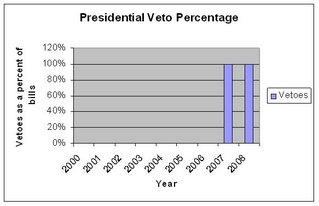Leveraging America's Prosperity
Leverage is not a dirty word. It increases returns to shareholders. Modigliani & Miller showed that you can have as much of it as you want, and it doesn’t matter because your capital structure doesn't affect cashflows to the firm. Sophisticated investors, when they believe they can manage the variance in returns and avoid bad scenarios, can’t get enough of it. Leveraged buyouts are all the rage right now because they make tons of money for the equity holders. It can make a trade that is otherwise not worth an investor's time into a very profitable one. Long Term Capital Management would have had pitiful if it wasn't for their immense leverage, but instead they had returns that exceeded 50%.
So why is leverage bad when the U.S. government engages in it? Much ado is made about our ballooning deficit, and to me it just looks like we're leveraging the United States. We're increasing the returns to our shareholders (citizens) by piling on debt. If the government borrows more, and spends more, its citizens enjoy a higher quality of life (in other words their equity in the country has a higher return).
Now, of course, this necessitates either higher tax rates in the future to pay the debt or constant tax rates with faster growth to generate more revenue. This is the point where the purpose of those borrowed funds becomes important. Not all spending was created equally. Investing those borrowed funds into education, R&D, and infrastructure allows the country and everyone in to be better off. Investing those funds into things that yield no increases in productivity and no increased growth in the future makes later generation worse off, but probably makes us better off today. And after all, isn’t a dollar today worth more than a dollar tomorrow?
Leveraging (deficit), and investing those borrowed funds into something that allows us to increase growth can do more harm than good if the right investments are made. If however, the money is invested into depreciating assets (such as missiles, which have a salvage value of 0 when they blow up) then the deficit may be bad (but will still increase prosperity today).
Some would even argue that it would be an act of gross mismanagement for our country not to leverage when the cost of funds is low (interest rates that by historical standards are still extremely low).
Tags: Leverage, Deficit, Economics, Finance, Modigliani Miller, Taxes
So why is leverage bad when the U.S. government engages in it? Much ado is made about our ballooning deficit, and to me it just looks like we're leveraging the United States. We're increasing the returns to our shareholders (citizens) by piling on debt. If the government borrows more, and spends more, its citizens enjoy a higher quality of life (in other words their equity in the country has a higher return).
Now, of course, this necessitates either higher tax rates in the future to pay the debt or constant tax rates with faster growth to generate more revenue. This is the point where the purpose of those borrowed funds becomes important. Not all spending was created equally. Investing those borrowed funds into education, R&D, and infrastructure allows the country and everyone in to be better off. Investing those funds into things that yield no increases in productivity and no increased growth in the future makes later generation worse off, but probably makes us better off today. And after all, isn’t a dollar today worth more than a dollar tomorrow?
Leveraging (deficit), and investing those borrowed funds into something that allows us to increase growth can do more harm than good if the right investments are made. If however, the money is invested into depreciating assets (such as missiles, which have a salvage value of 0 when they blow up) then the deficit may be bad (but will still increase prosperity today).
Some would even argue that it would be an act of gross mismanagement for our country not to leverage when the cost of funds is low (interest rates that by historical standards are still extremely low).
Tags: Leverage, Deficit, Economics, Finance, Modigliani Miller, Taxes
